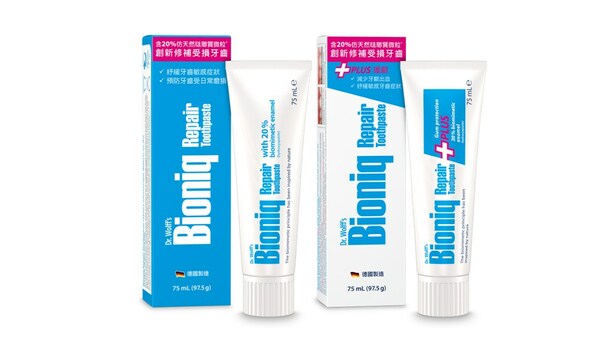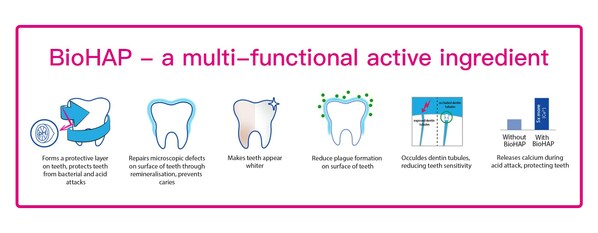HONG KONG, Jan. 4, 2023 /PRNewswire/ -- While most Westerners prefer trimmed meat and fish fillets, a vast majority of Asian diners enjoy eating their food off bones, picking flesh from carcasses, and gnawing on tendons, cartilage, and bones for gooey, chewy textures1.
Hong Kong, a food paradise in Asia, is home to many popular Cantonese dishes like steamed pork ribs and phoenix talons served in rattan steamers, juicy roasted geese drumsticks and mouth-watering sweet and sour pork ribs. These are commonly consumed dishes that the locals love.
However, one should exercise caution when consuming such dishes, as it increases the risk of masticatory accidents such as unexpected biting on a hard object, and in this case, stray bone fragments that are often hidden. These create tiny crack-lines on teeth, some on the surface while some are deeper into the dentine and may progress and extend into the dental pulp causing pain and sensitivity.
Higher risk of cracked tooth in Hong Kong especially during Chinese New Year
Especially during Chinese New Year, Hongkongers may consume more traditional snacks like sesame seed balls, melon seeds, candies, and nuts for their symbolic and auspicious meanings. These snacks apart from being sugary and sticky are also hard in nature and often requires a chewing force exerted so much that it can cause micro cracks to develop in the enamel structure.
According to a professor from HKU Faculty of Dentistry, cases of patients complaining about chewing pain, unexplainable sensitivity to hot/cold foods and all symptoms of "cracked tooth" often peaks during festive seasons2.
In 2015, 78% of cracked tooth cases were received in Q1 and most of these cases were aged 35 – 55 years old2.
The American Association of Endodontists defines a cracked tooth as an incomplete tooth fracture in which the enamel and dentin are broken apart or separated by external forces.
A cracked tooth is often difficult to diagnose and locate because symptoms appear inconsistently, and cracks may be too small to be observed. A cracked tooth can begin with craze lines on the enamel or a fractured cusp, or it can be a crack that does not separate the tooth fragment, or a crack that completely splits the tooth, and can even be a direct vertical root fracture3.
Weakened enamel can crack easily under pressure
In most cases of cracks, initial demineralisation of teeth caused by ageing, in which teeth are exposed to eroding agents for long periods of time, may already be present, causing instability and weakening of the enamel and thus causing the teeth to crack easily under pressure.
Teeth can also be weakened and easily chip off from decay and caries that eats up the enamel. Bacteria in our oral biome produce acids to break down sugar, causing demineralisation of enamel; therefore, bacterial removal is critical to prevent demineralisation and teeth from cracking.
Preventing cracked tooth starts from using the right toothpaste
Aside from keeping an eye on your diet and the effects it can have on your teeth, another method of prevention is to keep your teeth healthy and strong.
Dr. Frederic Meyer, an oral health scientist, emphasizes the importance of using a hydroxyapatite-containing biomimetic enamel toothpaste. He explains that the tooth enamel is made up of 97% hydroxyapatite, and that hydroxyapatite in toothpastes is a non-toxic active ingredient that can help repair microscopic enamel defects, remineralise demineralised teeth, and prevent decay and caries to keep teeth healthy and strong, preventing and reducing the risk of cracks. The efficacy of hydroxyapatite-containing oral care products has been tested in several different scientific studies4.
Introducing Bioniq® Repair Toothpaste from Germany with 20% BioHAP*
Bioniq® Repair Toothpaste
- Repairs microscopic defects on the enamel surface through remineralisation
- Prevents and protect teeth against acid/bacterial attacks and from daily wear
- Prevents plaque and tartar build-up
- Forms protective layer on enamel surface - long-lasting feeling of smoothness
Also available with added gum protection: Bioniq® Repair PLUS Toothpaste
- With added lactoferrin and hyaluronic acid known to combat oral bacteria
- Improves gum health and reduces bleeding
Active ingredient with extensive research: Studies shows efficacy
Over 200 international studies, including clinical trials, have already demonstrated BioHAP's* outstanding results in terms of mode of action: BioHAP* has been shown to adhere to the tooth surface.
- Deeply remineralise teeth for prevention and remineralisation of dental caries
- Prevents and reduces risk of decay and dental caries that weakens teeth
- Forms protective layer made from calcium during acid and bacterial attacks, protecting teeth from demineralisation
- Prevents and reduces dentin hypersensitivity through occlusion of dentin tubules
- Adhere to teeth and makes teeth appear whiter as it is also white in nature
Clinical studies have shown that using this active ingredient in toothpaste twice a day keeps both teeth and gums healthy and strong in the long run, supporting overall oral health. Bioniq® Repair toothpaste is a safer alternative to fluoridated toothpaste.
Bioniq® Repair Toothpaste and Bioniq Repair® Toothpaste PLUS is exclusively available in Mannings Hong Kong at HKD 69 and HKD 79 respectively.
Videos and Images: shorturl.at/BKT45
FAQ: https://www.bioniq-oralcare.com/en-hk/faq
Clinical Studies: https://www.bioniq-oralcare.com/en-hk/research
About Dr. Wolff
Founded in 1905, Dr. Wolff is one of the largest medium-sized family-owned businesses in the German cosmetics market.
The Dr. Wolff Group consists of the owner-managed companies Dr Kurt Wolff, Dr August Wolff and their international subsidiaries. Distinguished by the development and creative marketing of real innovations for more than 100 years, the company concentrates on products which embody verifiable advantages for consumers.
For more information, please visit: Dr. Wolff Group (drwolffgroup.com)
1 From fish heads to chicken feet: why some Asian diners love to gnaw on bones and gristlehttps://www.scmp.com/lifestyle/food-drink/article/3033027/fish-heads-chicken-feet-why-some-asian-diners-love-gnaw-bones |
2 Public Warned about Tooth Fractures from Snacking On Seeds and Nuts during Chinese Lunar New Year https://www.hku.hk/press/press-releases/detail/14003.html |
3 Li, F., Diao, Y., Wang, J., Hou, X., Qiao, S., Kong, J., ... & Jiang, H. B. (2021). Review of Cracked Tooth Syndrome: Etiology, Diagnosis, Management, and Prevention. Pain Research and Management, 2021. https://www.ncbi.nlm.nih.gov/pmc/articles/PMC3870147/ |
4 Enax, J., Fabritius, H. O., Fabritius-Vilpoux, K., Amaechi, B. T. & Meyer, F. Modes of action and clinical efficacy of particulate hydroxyapatite in preventive oral health care − state of the art. Open Dent J 13, 274-287 (2019). https://www.researchgate.net/publication/335263577_Modes_of_Action_and_Clinical_Efficacy_of_Particulate_Hydroxyapatite_in_Preventive_Oral_Health_Care_-_State_of_the_Art |
*BioHAP – Biomimetic Hydroxyapatite |













